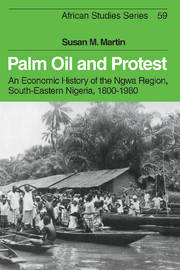Book contents
- Frontmatter
- Contents
- List of maps and figure
- Acknowledgements
- Abbreviations
- 1 Introduction
- 2 Ecology, society and economic change to 1891
- 3 The Ngwa and colonial rule, 1891–1914
- 4 The expansion of the oil palm industry, 1884–1914
- 5 The end of the boom
- 6 Cassava and Christianity
- 7 Authority, justice and property rights
- 8 Trade, credit and mobility
- 9 Production and protest: the Women Riot, 1929
- 10 Cash cropping and economic change, 1930–80
- 11 Conclusion
- Statistical appendix
- Notes
- Interviews conducted in the Ngwa region, 1980–1
- Bibliography
- Index
2 - Ecology, society and economic change to 1891
Published online by Cambridge University Press: 11 September 2009
- Frontmatter
- Contents
- List of maps and figure
- Acknowledgements
- Abbreviations
- 1 Introduction
- 2 Ecology, society and economic change to 1891
- 3 The Ngwa and colonial rule, 1891–1914
- 4 The expansion of the oil palm industry, 1884–1914
- 5 The end of the boom
- 6 Cassava and Christianity
- 7 Authority, justice and property rights
- 8 Trade, credit and mobility
- 9 Production and protest: the Women Riot, 1929
- 10 Cash cropping and economic change, 1930–80
- 11 Conclusion
- Statistical appendix
- Notes
- Interviews conducted in the Ngwa region, 1980–1
- Bibliography
- Index
Summary
The Ngwa have been settled yam farmers for as long as they can remember. Yet their traditional food producing economy was by no means static. Before the nineteenth century, migrations and the adoption of new crops helped to produce a distinctive social and economic system within which diversification was a continuing process, and youthful mobility an outstanding motif. During the nineteenth century the expansion of the oil palm export industry brought changes in production methods, further additions to the local diet, and changes in the balance of labour demands, power and responsibilities between men and women. Differences of wealth and seniority which had already arisen within the food producing economy came to take on a new meaning as the Ngwa became involved in cash crop production. Yet past patterns of production and social relations continued to have a vigour and an inner logic of development which influenced export sector developments, not only during the earlier nineteenth century, but also from 1891 under colonial rule.
These broad generalisations may seem at first sight to rest upon fragile foundations, for very little is known directly about the Ngwa economy in the pre-colonial period. The first written description of the region was made only in 1896, by a hostile observer who had passed through the region hastily on his way to a major market further north. However, two extensive sets of local oral traditions have been collected, by Jackson and Allen in the 1930s and by Oriji in the 1970s.
- Type
- Chapter
- Information
- Palm Oil and ProtestAn Economic History of the Ngwa Region, South-Eastern Nigeria, 1800–1980, pp. 17 - 35Publisher: Cambridge University PressPrint publication year: 1988



